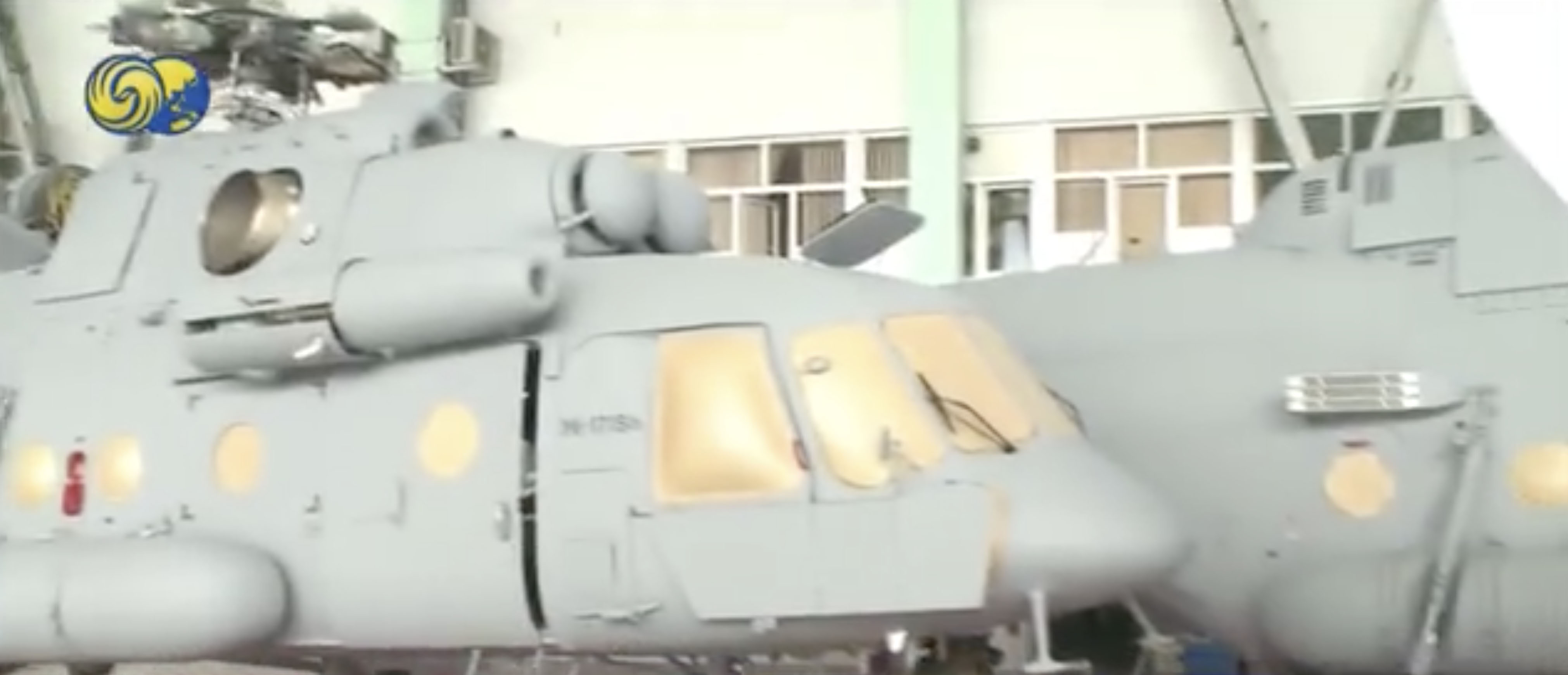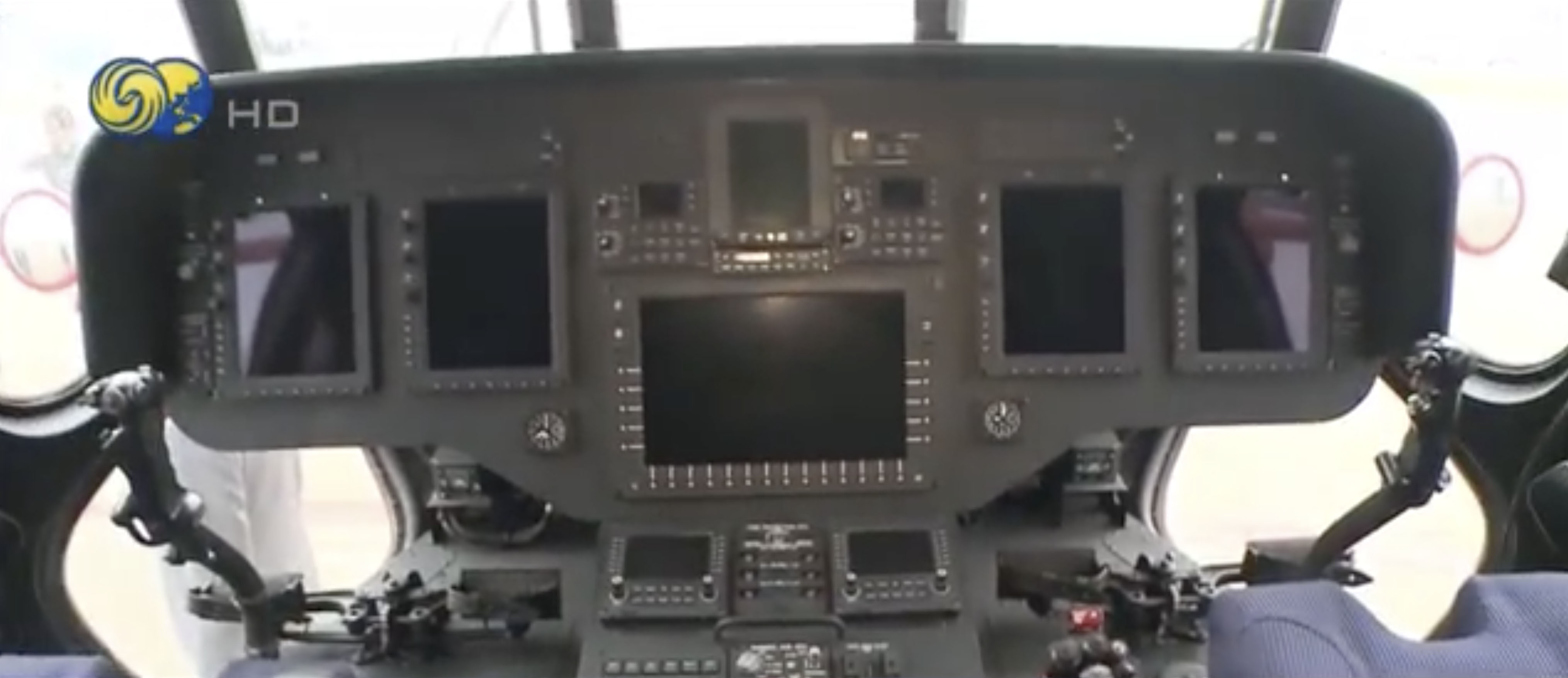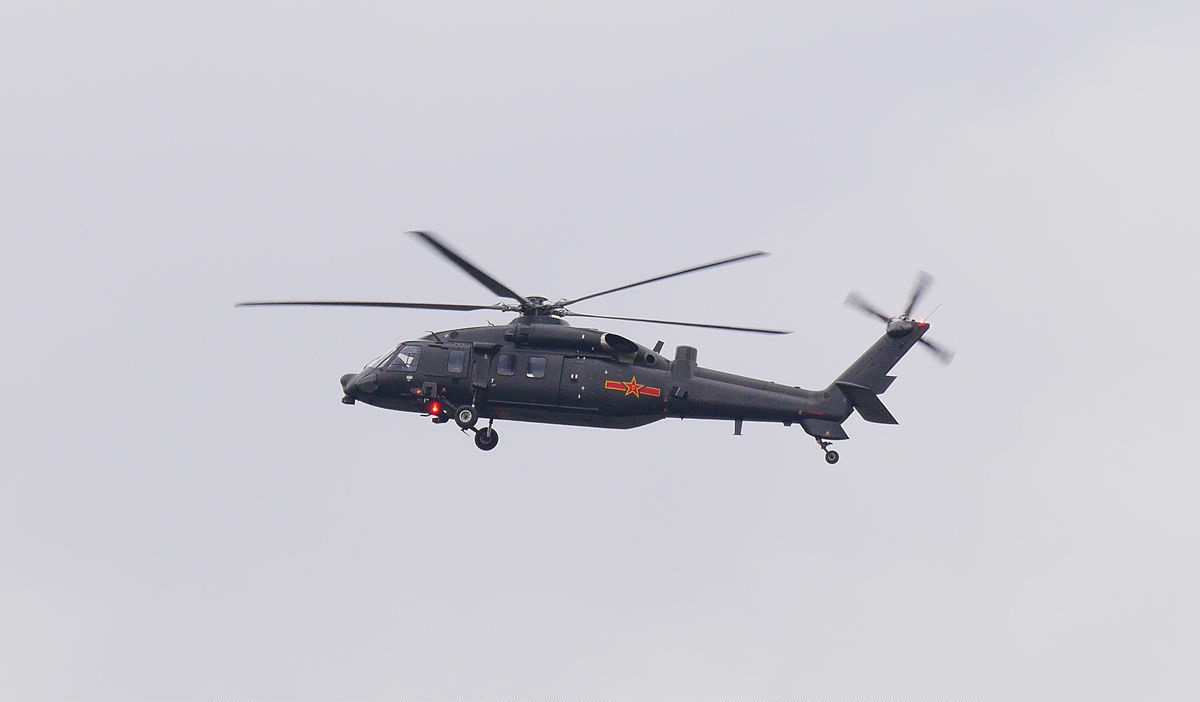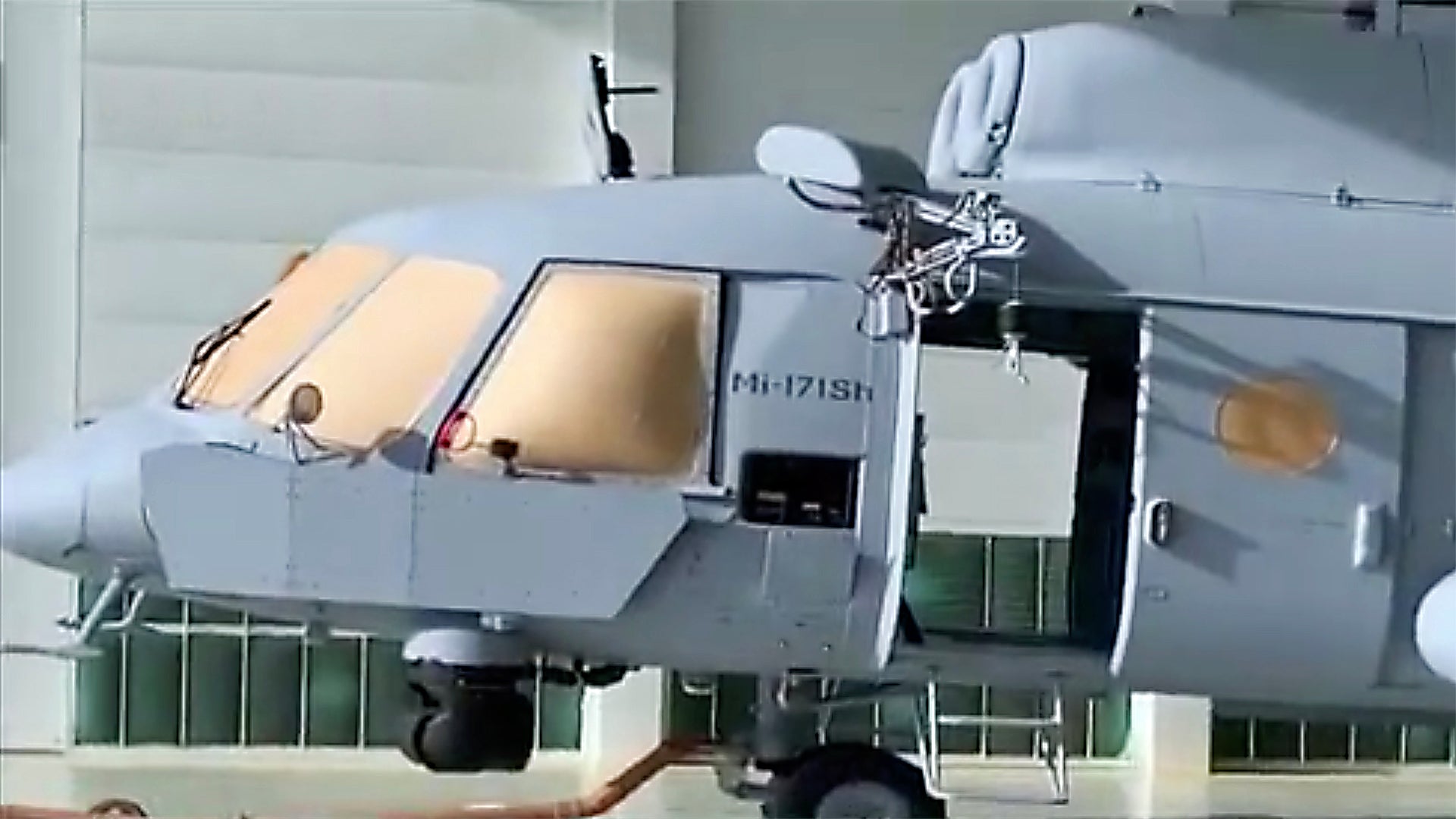The Chinese People’s Liberation Army is set to receive a new batch of Russian-made Mi-171Sh Hip combat transport helicopters, but their precise operator — and function — remains unknown.
Photos of one or more gray-painted Mi-171Sh helicopters in People’s Liberation Army (PLA) markings began to appear on social media earlier this week. The images were taken from a Chinese TV news report showing a visit to the Ulan-Ude Aviation Plant in the Russian Far East.
The low-visibility markings and ‘tactical’ light gray color scheme suggest a new batch of helicopters might have been acquired to fulfill some kind of role in support of PLA special operations forces or combat search and rescue (CSAR). PLA Army Aviation rotorcraft are otherwise normally painted very dark green overall or in a green and tan disruptive pattern.

Enigmatic Hips
The light gray colors are actually more reminiscent of the PLA Navy’s chopper fleet, but there’s no sign of maritime modifications for this Mi-171Sh, despite speculation that the helicopters are destined for the PLA Navy Marine Corps. So far, the global Hip fleet has seen only very limited naval service and it’s previously been anticipated that the Type 071 amphibious transport dock and the new Type 075 landing helicopter dock will both be equipped with Chinese-made helicopter types.

The Chinese Military Aviation blog recently noted a rumor suggesting that PLA Army Aviation might have ordered a new batch of Mi-171Sh aircraft together with a “complete” self-protection package including an electro-optical turret, armor, and countermeasures launchers. Chinese military aerospace observer Andreas Rupprecht is likewise skeptical that the Chinese Mi-171Sh helicopters are destined for Marine Corps service. The development is unexpected, Rupprecht contends, since the availability of China’s own Z-8G/L and Z-20 suggests there is no need for additional Mi-17/171s. He points to the combat capability of the Mi-171Sh suggesting they are intended to equip some kind of “special unit.”
It could be that the new helicopters have been procured with the current border tensions with India in the Himalayas in mind. Here, Beijing and New Delhi are at loggerheads over a 2,100-mile border, known as the Line of Actual Control, and a clash with Chinese troops in June 2020 left at least 20 Indian soldiers dead. This is truly demanding terrain for helicopters, and the Mi-171Sh might offer a high-altitude capability currently lacking from the PLA’s indigenous rotorcraft.
If the new helicopters are going to support some kind of special operations forces or fly CSAR duties, the Mi-171Sh may have been the most obvious choice, since these critical missions demand the most capable and mature airframe available. It could be that the PLA leadership considers that Russian equipment is still superior for this kind of work, at least in some respects, compared with the latest indigenous designs.

The Mi-171Sh variant of the venerable Soviet-designed helicopter was not previously in PLA service. In Russian military use, the aircraft is designated as the Mi-8AMTSh. This, in turn, is broadly similar to the Mi-8MTV-5 that’s built by Kazan Helicopters in western Russia. These models share a rear ramp (rather than the previous clamshell-style loading doors), cabin with seating for up to 36 troops and sliding doors on each side, and a streamlined nose accommodating a weather radar in place of the old rounded, glazed nose.

Chinese Hips
Today, the Mi-17 family is the PLA’s most important tactical transport helicopter, having entered service back in 1991, initially as a replacement for planned orders of Sikorsky S-70s that were scuppered following the U.S. arms embargo following the Tiananmen Square protests in 1989.
The first of the Hips received by the PLA were Mi-8s, all since retired, but these have been followed by numerous sub-variants, now numbering around 340 examples in total. The Mi-17 and Mi-171 designations refer to export-specific versions of the Hip, which are otherwise known as Mi-8s in Russian military service.

In his authoritative work on PLA Army Aviation, Andreas Rupprecht provides a useful breakdown of the country’s military/paramilitary Hip orders, from 1991 onwards:
1991 Mi-17V-1 24
1996-1997 Mi-17V-5 60
1999-2000 Mi-171 15
2002-2003 Mi-17V-5 35
2003-2004 Mi-17V-7 25
2007-2009 Mi-171E 57
2006-2007 Mi-171E 24
2010-2011 Mi-171E 32
2012-2014 Mi-171E 52
In terms of equipment fit, the PLA’s Mi-17V-1 and Mi-171 aircraft were typically upgraded after delivery, receiving identification friend or foe (IFF) equipment, ASO-2V chaff/flare dispensers, and external pylons for fuel tanks, 12.7mm machine gun pods, unguided rocket pods, freefall bombs, and even TY-90 air-to-air missiles. Other kit that has been added to the fleet includes a searchlight, forward-looking infrared (FLIR) turret, satellite communications (SATCOM) antenna, and a locally made infrared jammer. Some aircraft have also appeared with a missile approach warning system and radar warning receiver sensors on the nose and tail boom.

The Hip family has proven to be a popular choice for the PLA Army Aviation, and it has undertaken a wide range of roles, including transport of cargo/personnel, air assault, close air support, minelaying, airborne command post, medical evacuation, and search and rescue. Specialist roles have also yielded PLA-specific versions, including communications jamming, and battlefield surveillance. In the latter form, the Mi-171 is fitted with a retractable radar antenna.
The Kazan-built Mi-17V-5 and V-7 that were supplied to China between the mid-1990s and mid-2000s differ chiefly from their predecessors in being powered by uprated Klimov TV3-117VM engines each rated at 2,000 shaft horsepower. They were also the first for the PLA with the reap ramp and streamlined nose, the latter leading to the local nickname “Hippo.” Interestingly, it’s alleged that these helicopters were imported from Russia on behalf of China United Airlines, but were then immediately transferred to the military.
Like the previous versions, some of the PLA’s Mi-17V-5s and V-7s have been outfitted with external pylons, while some Mi-17V-5 are compatible with the KD-9 anti-tank guided missile. Other Mi-17V-7s are configured for search and rescue with an additional FLIR turret, searchlight, SATCOM antenna, and rescue hoist.
Until the appearance of the latest Mi-171Sh aircraft at the Ulan-Ude factory, the latest version to join the PLA ranks was the Mi-171E from the same manufacturer. This seems to have been acquired chiefly for operations in mountainous terrain. These helicopters boast an advanced cockpit with a digital moving map display and some also carry SATCOM and/or a 12.7mm caliber machine gun firing through the side door.
The PLA’s enduring relationship with the Hip looks set to continue, although previous suggestions of a deal for local assembly of Ulan-Ude-supplied airframes have never materialized.
Local rivals
It seems that plans to assemble the Hip in China may have been abandoned in favor of pursuing indigenous designs, including improved versions of the Z-8 and the Z-20, the latter bearing a close resemblance to the U.S. Black Hawk family.

With local helicopter programs making rapid progress, the appearance of these new Chinese combat rotorcraft at their Russian production facility is something of a surprise.
However, the fact that the Hip series has fulfilled so many different roles within the PLA — and has been successively upgraded with local enhancements — means it’s hard to predict how and where the new Mi-171Sh will eventually be fielded.
Contact the author: thomas@thedrive.com
